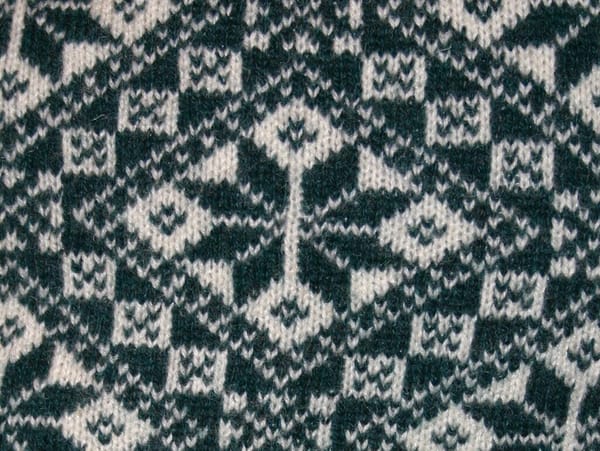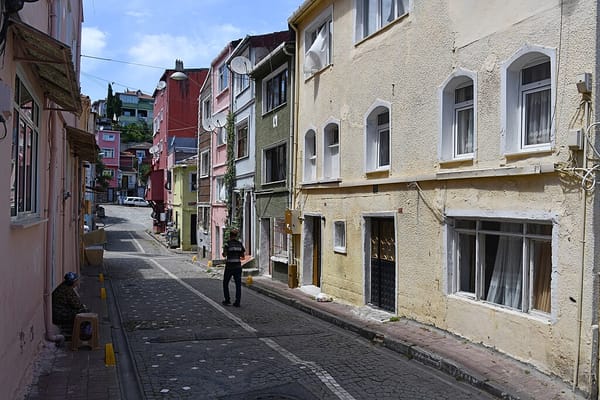Kanji & Predator
Does Kanji make expressing complex concepts easier? Also, how Dominique Pelicot became one of the worst sexual predators in history.

Featured Articles
A Kanji Always Pays Her Debts
Aether Mug • 10 Dec 2024 • ~2200 words
Marco Giancotti starts with an elevator sign and goes on to compare Western/phonetic languages to kanji. While kanji has a steeper learning curve at first, once you do learn them, they make comprehending even complex words and concepts much easier.
Fortunately, I can peek at the five kanji 細胞構築学 written next to the English word, and instantly everything is clear. These are all easy kanji that Japanese children learn early on, and that I've seen myself many times before. Here, the Japanese term is actually made of three common "words" (actually, the first two are "compounds", combinations of characters, and the third is a standalone character): 細胞 (saibou, cell), 構築 (kouchiku, construction), and 学 (gaku, "discipline"). It must be the study of how cells are built and structured! If the English term carved in the wooden panel had been "cell architectonics", it would have had the same clarity as the Japanese. Instead, it was cytoarchitectonics, a rather scary word.
‘A rapist can be in the family’: how Dominique Pelicot became one of the worst sexual predators in history
The Guardian • 11 Dec 2024 • ~4500 words
Gisèle Pelicot had no idea her husband of 50 years had been drugging her and inviting dozens of men to rape her. As one of the most horrific trials France has ever seen comes to a close, the world is left asking: how could this happen?
Gisèle Pelicot, 72, has become a feminist hero for insisting that the rape trial of her now ex-husband Dominique and 50 other accused men should be held in public so that shame could change sides. The story of all these men and their alleged sex crimes must be told, she said, in order to end what she called “rape culture”, where sexual violence is so commonplace in society it is almost shrugged off, and because Pelicot and the men got away with it for so long.
Recommended Articles
What If the Body Politic Kept the Score?
Public Books • 11 Dec 2024 • ~3100 words
Bringing story and social action back into the healing process is the unfinished work of addressing existential suffering.
How do we make sense of such wildly different approaches to healing trauma, diverging over whether to focus on the body or the mind? It is tempting to read the somatic approach as: Your issues are in your tissues, so distrust your thoughts. It is equally easy to interpret the neuroscientific evidence as: Trauma is all in your head, so ignore embodied sensation. But—as someone with very mild and mostly manageable post-traumatic stress disorder—I haven’t found either extreme useful. For me, EMDR did not offer substantial relief on its own. But neither did cognitive behavioral therapy. Perhaps, for those of us reeling from trauma or severe mental illness, the grinding work of healing might be easier if those around us dechambered their silver bullets.
Sniffing out the mysteries of olfaction
The Transmitter • 11 Dec 2024 • ~2450 words
A background in physics, and his own curiosity, have helped Dmitry Rinberg tackle the complexities of the neuroscience of smell.
Even though it is thought that olfaction was one of the earliest senses to evolve, scientists know less about how we perceive smells than about vision or auditory processing. Joel Mainland, a member of the Monell Chemical Senses Center and adjunct associate professor of neuroscience at the University of Pennsylvania, notes that science has “not spent the same amount of time and resources on understanding olfaction” as it has on other senses.
Seriality and Slow Grief
Los Angeles Review of Books • 9 Dec 2024 • ~3540 words
Lauren Eriks Cline looks back at 20 years of the TV series “Lost” and the lessons it holds for us today.
Lost was a key player in the rise of the trauma plot, which frames characters’ behaviors as symptoms of the damage they incurred in the past. Unsurprisingly, for a show whose initial cast of characters understood themselves as the “survivors” of Oceanic Flight 815, much of the traumatic material Lost explores has to do with grief: the liquor bottle is revealed to be a coping mechanism bequeathed by a dead alcoholic father; the handcuffs, a punishment for a murder; the wheelchair, a consequence of a near-fatal attack.
How Daniel Penny Was Found Not Guilty in a Subway Killing That Divided New York
The New Yorker • 9 Dec 2024 • ~3150 words • Archive Link
The trial over the death of Jordan Neely, which made Penny a right-wing cause célèbre, became a flash point in the debate over crime and vigilantism in big cities.
It is a strange thing to sit in a courtroom and watch a man die over and over and over again. At first, the people assembled reacted to the videos with great emotion. Spectators in the gallery cried and gasped, as Neely’s legs flailed about and then slowed down and stopped moving altogether before Penny released his hold on Neely’s neck and got up, fifty-one seconds later. The jurors fidgeted in their seats. The judge stood up. Two court officers, both of whom carried guns and handcuffs and wore black bulletproof vests and otherwise stoic expressions, wiped tears from their eyes. Jordan Neely’s father, Andre Zachery, wept quietly, then loudly, then walked out of the courtroom; later, he returned to his seat and hung his head. The second time the Vasquez video played, there were more grimaces in the jury box, but in the course of the following five weeks the jurors adopted passive, detached expressions.
To Speak the Language of the Land
Hakai Magazine • 12 Dec 2024 • ~4850 words
Māori people are reclaiming their native language, even in the face of growing threats to the natural world on which it depends.
These are modern examples of an older, deeper spiritual hurt for Māori. The country’s once-vast labyrinth of wetlands is almost gone, drained by farmers for pastureland. Forest clearing and non-native mammals, including predators like stoats and possums, add to the devastation. We’ve already lost many of the subjects of our sayings, like the huia, a type of wattlebird, and koreke, the New Zealand quail. With the exception of seafood, most native species are now so rare that they require protection: it is either unsafe or illegal for Māori to eat many of our traditional foods.
The Gold Rush at the Heart of a Civil War
New York Times • 11 Dec 2024 • ~4400 words • Archive Link
Famine and ethnic cleansing stalk Sudan. Yet the gold trade is booming, enriching generals and propelling the fight.
The luxury jet touched down in Juba, the capital of South Sudan, on a mission to collect hundreds of pounds of illicit gold. On board was a representative of a ruthless paramilitary group accused of ethnic cleansing in Sudan’s sprawling civil war, the flight manifest showed. The gold itself had been smuggled from Darfur, a region of famine and fear in Sudan that is largely under his group’s brutal control. Porters grunted as they heaved cases filled with gold, about $25 million worth, onto the plane, said three people involved with or briefed on the deal. Airport officials discreetly maintained a perimeter around the jet, which stood out in the main airport of one of the world’s poorest countries.




